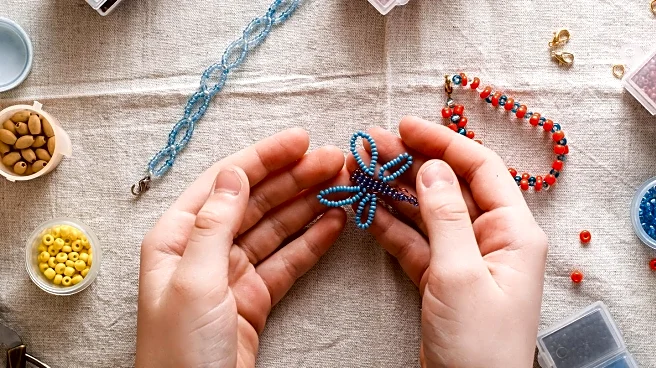What's Happening?
Hobby kits are gaining popularity as a means to reclaim personal time and reduce stress. These kits offer a variety of activities, from traditional crafts like knitting and baking to modern pursuits such as resin art and candle making. The kits come with all necessary materials and instructions, making it easy for individuals to explore new hobbies. Popular options include crafting crates, bread-making kits, needle felting sets, and yoga accessories. These kits are designed to provide a creative outlet and a sense of accomplishment, helping individuals combat burnout and find personal fulfillment.
Why It's Important?
The rise in hobby kits reflects a growing trend towards self-care and stress management. As people juggle multiple roles and responsibilities, finding time for personal hobbies can be a powerful way to alleviate stress and improve mental health. Engaging in hobbies has been shown to reduce anxiety and increase overall well-being. This trend also highlights a shift towards more mindful and intentional living, where individuals prioritize activities that bring joy and relaxation. The availability of diverse hobby kits allows people to explore new interests and develop skills, contributing to a more balanced lifestyle.
What's Next?
As the demand for hobby kits continues to grow, manufacturers may expand their offerings to include more specialized and diverse options. Retailers could see increased sales in this category, prompting them to stock a wider range of kits. Additionally, the popularity of hobby kits may encourage more people to share their experiences and creations online, fostering a community of hobby enthusiasts. This could lead to collaborations and the development of new hobby trends. Businesses may also capitalize on this trend by offering workshops and classes to complement the kits, further enhancing the hobby experience.
Beyond the Headlines
The trend towards hobby kits may have deeper implications for consumer behavior and lifestyle choices. As people seek more meaningful and fulfilling activities, there could be a shift away from passive entertainment towards active engagement. This could influence how individuals spend their leisure time and impact industries related to entertainment and recreation. Moreover, the focus on self-care and stress relief may drive innovation in wellness products and services, as consumers increasingly prioritize their mental and emotional health.









